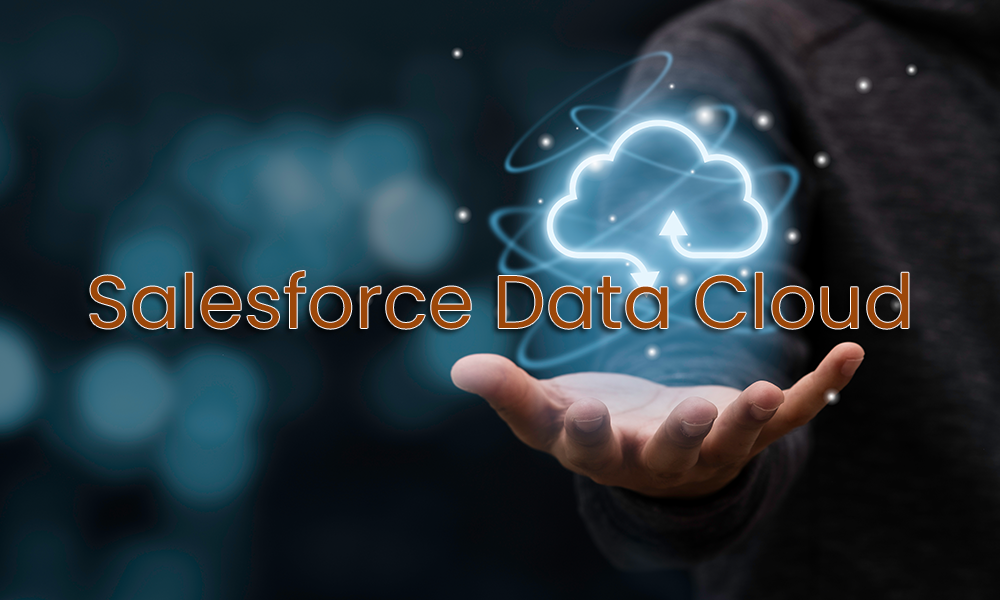Salesforce pays significant attention to each of its child products, when it comes to their nomenclature, advantages, or use cases. In recent times the cloud CRM Company has changed the name of one of its most admired tools Customer Data Platform to Salesforce Data Cloud.
The journey of Salesforce Data Cloud has been quite interesting. Previously known as Customer Audiences 360, the Salesforce Data Cloud went through several iterations because it was difficult for Salesforce to position this platform.
If you also want to use the Salesforce data cloud, this article is for you. We will discuss the reasons to invest in Data Cloud and what skills a business should see before it invests in Salesforce data cloud implementation services.

Salesforce Data Cloud CDP
Data is a fuel that fans the ignition of growth and success. A well-collected, well-managed, and optimally utilized data ensures the proper functioning of sales, marketing, and other operations in a company.
In today’s digital age, customers expect personalized and seamless experiences from businesses. They want companies to understand their preferences and provide relevant recommendations and offers. This is where Salesforce CDP (Customer Data Platform) comes in.
Salesforce Data Cloud CDP helps businesses unify their customer data from various sources and gain a comprehensive view of their customers, enabling them to create personalized and relevant experiences that drive customer satisfaction and loyalty.
Data Cloud harnesses the powers of flexible data models along with substantial data processing power through which it combines data from different sources and brings it on a unified platform. It builds a unified customer profile that helps businesses offer customized and personalized interaction as per customers’ requirements.
Key Reasons to Hire Salesforce Data Cloud Consultants
Salesforce Data Cloud CDP –formally known as the Customer Data Platform, is a critical tool for businesses that want to deliver personalized and seamless experiences to their customers. It enables businesses to gain a comprehensive view of their customers, create targeted campaigns and offers, provide better customer service, and ensure data governance and security. With Salesforce CDP, businesses can optimize their marketing and sales strategies, increase customer satisfaction and loyalty, and ultimately drive growth and revenue.
Comprehensive Customer Insights
Salesforce Data Cloud CDP provides businesses with a 360-degree view of their customers, enabling them to understand their behavior, preferences, and interactions across multiple channels and touchpoints. This allows businesses to create personalized and relevant experiences that drive customer satisfaction and loyalty.
Personalization
Data Cloud CDP enables businesses to create personalized experiences for their customers by using customer data to tailor offers and recommendations based on their preferences and behavior. This can help businesses increase customer satisfaction, retention, and revenue.
Improved Marketing and Sales Performance
By using Salesforce Data Cloud CDP, businesses can create targeted campaigns and offers based on customer insights, resulting in improved conversion rates and revenue. It allows businesses to optimize their marketing and sales strategies based on a better understanding of their customers.
Better Customer Service
Salesforce Data Cloud implementation enables businesses to provide more personalized and effective customer service by understanding the customer’s journey and preferences. This can lead to higher customer satisfaction and retention.
Data Governance and Security
The Salesforce Data Cloud model also provides businesses with a secure and centralized platform to manage customer data, ensuring data governance and compliance with data protection regulations.
Integration with other Salesforce Products
Salesforce Data Cloud integration with other Salesforce products, such as Sales Cloud, Marketing Cloud, and Service Cloud, allows businesses to leverage their customer data across different departments and functions.
Successful Salesforce Data Cloud Implementation – Required Skills Set
Data Cloud CDP (Customer Data Platform) implementation requires a range of technical and non-technical skills. Here are some of the key skills required for Salesforce CDP implementation:
Development Skills
A need for strong coding skills becomes imperative when it comes to Salesforce implementation services. Whenever data comes into the Data cloud or a business wants to update an event, one requires strong development skills to perform a seamless development process.
A developer should know the API integrations and SDKs. One should be well aware of website & mobile app event tracking, and a developer must know about the Salesforce connectors, JSON data structure, and other code languages like Apex and JavaScript.
Salesforce Platform Knowledge
A thorough understanding of the Salesforce platform is essential for Salesforce Data Cloud CDP implementation. This includes knowledge of Salesforce CRM, Marketing Cloud, Sales Cloud, and Service Cloud, as well as the Salesforce data model and APIs.
Data Management
Data Cloud CDP implementation services require a strong understanding of data management principles. It includes data modeling, data integration, and data quality. Knowledge of ETL (Extract, Transform, Load) tools, SQL, and data warehousing is also important.
Data Management is a crucial skill that a Data Cloud professional must possess. The management of data needs two thirds of the working effort. For successful data management, certified Salesforce professionals must have the ability to handle data architecture, data modeling, data duplication management, consent management, identity management, building customer segmentation, and handling contacts & subscribers.
Business Analysis
Along with Admins and Developers, Salesforce Business Analyst has become an imperative part of the Salesforce ecosystem.
Understanding business requirements and translating them into technical specifications is critical for Salesforce CDP implementation. Business analysis skills are necessary to identify the key use cases and develop a data strategy that meets business needs.
A Salesforce professional with good analytical skills helps you identify and solve business challenges in a most efficient way without having you risked your money, efforts, and system.
When you hire Salesforce consulting company or an individual certified Salesforce consultant, make sure they have the following analytical skills –
- Ability to handle team
- Dexterity in business process mapping
- Skilled in user story building
- Communicating platform value to stakeholders
- Ability to map customers’ journey
- Strong analytical skills to elicit the requirements of customers, teams, businesses, and other stakeholders.
Technical Architecture
Data Cloud implementation requires a strong understanding of technical architecture principles, including system design, configuration, and deployment. Knowledge of software development methodologies such as Agile and Waterfall is also important.
Project Management
The implementation process of the Data Cloud involves managing projects, coordinating stakeholders, and ensuring project delivery on time and within budget. Project management skills, including planning, scheduling, risk management, and stakeholder communication, are essential.
Communication and Collaboration
Salesforce Data Cloud professional involves working with a range of stakeholders, including business users, IT teams, and vendors. Effective communication and collaboration skills are necessary to build relationships and manage expectations.
Analytical and Problem-solving
Analytical and problem-solving skills are essential for Salesforce CDP implementation. The ability to analyze complex data, identify patterns, and develop solutions to problems is necessary to ensure the successful implementation of Salesforce Data Cloud CDP.
Who do You Need in Your Team for Successful Data Cloud Implementation?
Project Manager
A project manager is responsible for managing the implementation project, coordinating the team, ensuring project delivery within budget and timeline, and managing stakeholders’ expectations. The one also understands end-customers & business requirements and then updates the current data model. They are liable to complete the project within a timeline, treat blockers, and streamline the implementation process.
Data Scientist
A data scientist is responsible for analyzing customer data and providing insights and recommendations to improve customer engagement and satisfaction. They have expertise in data analysis, statistical modeling, and machine learning.
Business Analyst
A business analyst is responsible for understanding business requirements, identifying use cases, and translating them into technical specifications. They work closely with business stakeholders to ensure the solution meets their needs.
Data Architect
A data architect is responsible for designing the data architecture and data integration strategy for Salesforce CDP implementation. They have expertise in data modeling, ETL (Extract, Transform, Load), and data quality.
Marketing Specialist
A marketing specialist in a team eases the work of a CDP professional. A marketing expert is aware of customers’ data and its sources. One also knows the way customer segmentation works and its potential use.
Marketing specialists and Cloud Data professionals together identify & build customer segments with the help of CDP and make them active on different platforms like mobile apps, Salesforce Marketing Cloud, etc.
Salesforce Developer
A back-end Salesforce developer is responsible for configuring and customizing Salesforce Data Cloud to meet business requirements. They have expertise in Salesforce development tools such as Apex, Visualforce, and Lightning Components.
Developers work closely with customer data specialists and ensure the seamless, accurate, complete, and compatible inflow of data into the Data Cloud.
Integration Specialist
An integration specialist is responsible for integrating Salesforce CDP with other systems and applications, such as CRM, marketing automation, and data warehouses. They have expertise in API integration and middleware tools.
Quality Assurance Analyst
A quality assurance analyst is responsible for testing the solution to ensure it meets the business requirements and quality standards. They have expertise in test planning, test execution, and defect management.
Change Management Specialist
A change management specialist is responsible for managing organizational change and ensuring the successful adoption of Salesforce CDP. They have expertise in change management methodologies and communication strategies.
Conclusion
The aim of this article is to help you understand the importance of the Data Cloud platform. We hope you now have at least a basic knowledge of Salesforce Data Cloud and the skills that you need to leverage this tool.
There is no specific guide that can tell you to follow this step for successful data implementation. However, with our years of experience, we have mustered this guide for you and we hope that it will prove helpful to you at the time you hire a Salesforce consulting company.








